You are currently browsing the daily archive for April 27, 2009.
An Excerpt from
With Pain and Love for Contemporary
Man
by Elder Paisios the Athonite (+1994)
Our Lord Jesus Christ, with His great love and joy which fill the souls of the faithful during His holy feast days, exalts us spiritually and truly resurrects us. All we need to do is participate in these feasts and celebrate them with a spiritual appetite; for once we taste the heavenly wine to which the saints will treat us, we will become drunk in spirit.
— Geronda (Elder in Greek), what must we do to live a spiritual life during these feasts?
— To live through Christ’s feasts in a spiritual way, we must keep our minds focused on the holy days themselves and not on the work that we have to do to prepare for them. We should think about the events of each holy day (Nativity, Theophany, Pascha and so on) and say the Jesus Prayer glorifying God in our heart. This way we will celebrate with reverence every feast day of the Church. For most people, who live in the world, Nativity is the time to eat pork, Pascha to eat lamb and the Meat-fare week at the beginning of Lent, the time to throw confetti. But for the true monks, every week is Holy Week. Every Wednesday, Thursday and Friday they experience Holy and Great Wednesday, Holy and Great Thursday, and Holy and Great Friday, that is, the days of the Passion of Christ, and every Sunday is for them Pascha, the Day of the Resurrection. Why must we wait until Holy Week to remember the Passion of Christ? Why should we be like people who live in the world? Can’t we realize what Christ is risen means, without eating lamb? You see, Christ said, Therefore be ye also ready, for in such an hour as ye think not, the Son of Man cometh (Matthew 24:44). He did not say, “Get ready right now!” From the moment Christ said, “Be ready!” we must all, but especially monks and nuns, be constantly vigilant and ready.
We must study and live through these divine events all the time. When someone studies the events of each feast day, he will be naturally moved to pray with particular reverence. Then, during liturgical services, our mind will be absorbed by the events we are celebrating and we will follow with great reverence the chanting of hymns. When our mind thinks divine thoughts, we get to live through these holy events, and in this manner we are transformed. We think of a saint for whom we have a special devotion, or of the saint whose feast day we are celebrating, and our mind rises higher toward Heaven. And when we keep the saints in mind, they keep us in mind, too, and they come to our assistance. This is how we can start a friendship with them, the one that will last forever. And so, even though we may live alone, we will actually share our lives with everybody: with the saints, the angels, the whole world. Imagine, being alone, and feeling their company! This is the living presence of the saints who are God’s children and will reach out to help us, their poor brothers and sisters.
Our saints have shed blood, sweat and tears for the love of Christ. We should always celebrate them with reverence, and they will be there to help us. Every time we hear the Synaxarion “On this same day, we commemorate Saint …,” we must rise to our feet, like soldiers standing at attention when the names of their fallen comrades who died heroically are being read.
If we want to really feel the significance of a feast day, we must abstain from all work. On Holy and Great Friday, for instance, the only thing we should be doing is praying. For people who live in the world, Holy Week is full of chores. On Great Friday, they will exchange good wishes “Happy Easter!” This is so wrong! On Holy and Great Friday, I will lock myself in my Kalyvi (monastic hut). Silence will be of great help to the soul. It’s very much like the time that follows the reception of the Great Schema, when a monk or nun will spend a whole week in silence to allow Divine Grace to fill the soul and to appreciate what has actually taken place. In silence, we get the opportunity to rest a little, to study and pray. When a good thought crosses our mind, when we examine ourselves, or say the Jesus Prayer, we will really come to feel something of the divine event celebrated on that day.
“Better Is a Little That the Righteous Has”
It is unfortunate that in our days we don’t use freedom to do good and become holy; instead, we use freedom to become more secular. In the past, people would work all week and rest on Sunday, a holy day. Now, they rest on Saturday as well. But are their lives more spiritual? Or are they more sinful? If people spent their time on spiritual work (prayer, spiritual study and so forth), things could have been different; people would live more conservative and decent lives. But we poor human beings try to rob time from the spiritual things, from Christ. People who live in the world will arrange to do all their heavy chores on Sundays. They are trying to find one Sunday for this chore, a holy day for another, and that’s how they bring God’s wrath on themselves. Why would the saints then come to their assistance? Turn Sunday into a chore day? Never! Even if others offer to help us on that day, we should never accept it. Not on a Sunday.
We do not allow God to be in charge. And so, everything that we do without faith in God has nothing to do with Him; it belongs to the world. It does not have His blessing and for this reason the outcome is never good. When we work on holy days, we give the devil rights and then he gets involved in our affairs. The Psalm reads: Better is the little that the righteous has than the abundance of riches of the wicked (Psalm 36:16). This is the kind of life that will receive a blessing. The rest is as worthy as shavings. But in order to live this way, we must have faith, philotimo (responsive gratefulness) and reverence, and put God in charge of our lives. And you’ll see that God will never abandon you.
I remember once, some threshing machines were brought to the village, and my father was notified that they could start on Sunday from our fields, and then move downhill to other lots. My father said to me, “What should we do? The machines are here.” “There is no way I will work on Sunday,” I replied. “We can do it on Monday.” “But,” my father objected, “if we miss this opportunity, we’ll have such a hard time threshing with the horses.” “That’s fine with me,” I said. “If I have to, I’ll be threshing all the way to Nativity.” So, I went to church anyway, without giving the matter any more thought. Well, as the machines started coming toward our field, they broke down. “Forgive us, but the machines won’t work. We’ll take them to Yiannena and fix them, and when we come back on Monday, you will be first in line!” So instead of threshing on Sunday, they ended up threshing on Monday. I’ve seen this kind of thing happen so many times.
What Are Laypeople Supposed to Do?
How different was the spirit of monasticism in the old days! I remember how laypeople, who celebrated the Feast of the Holy Cross according to the new calendar, would come to the Holy Mountain after the feast and bring us grapes. Sometimes, the day they arrived, we would be celebrating the Feast of the Holy Cross according to our calendar. But the Fathers would never go to unload the boat on such a day. They would send them back, or just leave them there, both the caïque (a wooden fishing boat) and the grapes. They would do the same if an olive oil or wood shipment would happen to arrive on the day of a feast. And the monasteries were poor. The monks were thinking: “What will people say if they see monks working on this day?” They would rather have a storm take the load, and lose the oil and the grapes, than to go and unload the ship, miss the Feast and scandalize souls.
Not so today… I happened to be at a monastery on the eve of a feast day, and the monks were unloading grapes. The entire brotherhood later gathered together to squeeze them. That night they were supposed to have a Vigil, but they decided to postpone it and transfer it to another time. And that was a major Feast! In another place, they were repairing a monastery damaged by fire, on a Sunday. Just wait, it will burn down again! When people who live in the world see these things, they naturally say to themselves, “Feast days mean nothing anymore.” People who live in the world are looking for an excuse to justify their sins.
We monks should be especially careful not to work on feast days, not only because doing so is a sin, but because we also become a cause for scandal; we sin twice.
— Geronda, this is what actually happened. One of the Sisters did not think of telling a worker to come another day. So he ended up working on a feast day.
— Then the Sister needs to be given a canon. (Here, canon is the discipline imposed by a Spiritual Father upon the believing sinner in the context of the Mystery of Repentance for his or her correction. Such discipline could take the form of fasting, almsgiving, prayer, abstinence from Holy Communion for a specified time and so on).
— Geronda, on a feast day, after the Vigil is over, if one becomes sleepy, can they do some handiwork while saying the Jesus Prayer?
— Can’t she do prostrations? Let her do prostrations to overcome her sleepiness. Why do handiwork?
— How about on Sunday? Is it right to weave a komboschoini (Greek for prayer rope) after a Sister has performed her spiritual duties?
— Why should you weave a komboschoini? Why not enjoy this day’s full spiritual nourishment? Unfortunately the spirit of the world is entering our monasteries. From what I hear, there are monasteries where, on Sunday afternoons or in the afternoon of a feast day, they will return to their chores and duties. As if they have children that are dying from hunger or owe heavy debts that will force them to auction their house! Where’s the need? Of course, it’s different with the monk or nun who serves the visitors, or the cooks who serve in the kitchen. Someone needs to be there to do the necessary work.
Do you remember Father Menas in the Skete of Saint Anna? A fisherman brought him fish on a Sunday morning, for the feast day. “It’s fresh, Geronda,” he said. “Today is Sunday, when did you catch it and it’s so fresh?” he replied, puzzled. “This morning,” the man answered. “Throw them away, son, they’re anathematized,” Father Menas responded. “And if you want to make sure that I’m telling you the truth, give one to the cat and see if it will eat it.” And indeed, the fisherman threw the cat a fish but the animal turned its head away, with repulsion. That’s how sensitive monks were in those days!
Once, on the Feast of the Theotokos in August, a monastery had a whole crew working with chain saws in the forest, gathering wood. Even though it was a clear day, suddenly it got cloudy, and lightning struck just next to the woodcutters, who were so terrified that they left without even notifying anyone that the forest was on fire. It took them forever to put out the fire. The following Sunday, two wood cutting crews went out again. These fires are God’s wrath, because we have turned Sundays and feast days into working days. And the sad thing is that we don’t realize what we are doing. We are pushing God’s tolerance and patience to its limits.
If there is a need for something, the monks will pray, saying the Jesus Prayer one hundred times each, and God will enlighten someone to send them a hundred thousand drachmas. The monk’s job is prayer. If we don’t put our trust in God, who will? Those who live in the world? God feels obligated to hear the prayer of the monk who has entrusted his life to Him. When I lived in the Coenobium (monastery), there was a monk who assisted the Abbot. He was not quick at all; in fact, he never left before the Divine Liturgy ended, and yet he always managed to finish all his chores. I, on the other hand, who was quicker and left before the Liturgy ended to prepare the assembly room, would be running into all kinds of problems. Sometimes I would mishandle the coffee beaker and the coffee would spill all over; other times I would drop the cups and the glasses; something would always go wrong! But he would wait until the end of the Liturgy. He would cross himself and trust in God to help him. If he were ever reprimanded, he would accept it with humility. He was humble and benefited twice as much.
When we don’t get stuck on unimportant details, which would cause no harm if omitted, we will benefit twice as much from whatever good we do, and give to the saints, whose feasts we celebrate, double the praise they are due. We should try to the best of our ability, not to devote ourselves to work at the expense of our spiritual life, which should always come first; this way, no matter what job we do, we’ll have the blessing of God. It’s our spiritual life that must come first, not material things. If we put our work ahead of everything else and put prayer in second place, this means that for us work is more important than prayer. It is pride and irreverence that lie behind this attitude. The work of the spiritually bankrupt cannot be sanctified. If we put spiritual matters first, God will take care of us. When we monks don’t observe feast days, what are laypeople supposed to do? If we don’t do our spiritual work and plead with the saints to help us, who will? What happens is that we end up saying all the time that we believe in God, but in reality we don’t even trust in Him. If we monks and nuns, who wear the monastic cassock, will not respect the Canons of the Church, and violate and dishonor Her age-old traditions, what possible meaning can our lives have?
Normally, we must cease all work before the Vespers of Sunday or of a feast day. If arrangements can be made, it is better to work more on the previous day, and avoid any work after the Vespers of a festal celebration. It is a different matter, if, in the event of an emergency, some light tasks need to be taken care of in the afternoon of a Sunday or a feast day. But even in such cases, the work should be done with discretion. In the old days, when farmers out in the fields heard the church bell announcing Vespers, they would do the sign of the cross and cease all work. The women of the neighbourhood would do the same. They would stand up, cross themselves and stop knitting or anything else they were doing. And God would bless them. They had their health and enjoyed life… Now they have abolished the feast days, distanced themselves from God and the Church, and not surprisingly, end up spending all the money they earn on doctors and hospitals… Once, a man came to my Kalyvi (monastic hut) and said, “My boy gets sick very often and doctors cannot figure out what’s wrong with him.” “Stop working on Sundays and things will change,” I told him. He followed my advice, and his little boy recovered.
I always tell people that if they want to avoid calamities in their life, they should stop working on Sundays and feast days. Work schedules could be arranged to keep these days free. Where there is spiritual sensitivity, everything is possible; solutions will be found. That’s really the issue here. Even if a particular solution is to our disadvantage, and we suffer a loss, in the end we’ll be twice blessed. But so many people fail to understand this. They do not even attend the Divine Liturgy. The Divine Liturgy sanctifies. If a Christian will not go to Church on Sunday, how will he be sanctified?
It’s unfortunate, but, the way things are going, people will do away with feast days, and with everything else. You see, they are even changing their names, and are forgetting their saints whose name they bear. If they are named Vasilike, they change it to Vicky; Zoe (Life) to Zozo — which sounds like saying zo (animal) twice! They have come up with new feasts, Mother’s Day, May Day, April Fools’ Day… Pretty soon they’ll say, “Today is Artichoke Day, tomorrow Cypress Day, later the birthday of the inventor of the atom bomb, or of soccer and so on…” But God will not abandon us…
By Father George Calciu
What new word can I share with you my friends? Since then (1) many long years have passed. A new generation has arisen, tested by unique experience and, perhaps, touched by a new skepticism born from contact with the Western world estranged from the right Faith.
Perhaps today, even more so than when I delivered those “Seven Homilies to the Youth” (1), the soul of young people – whom I consider as much my friends as I did back then (because I still speak in the name of Jesus Christ) – is increasingly assaulted by mental illness.
This is brought about by the treacherous propaganda from the West, under the mask of liberal democracy, which often takes on the appearance of Christianity, just as Satan dons angelic light to deceive as many as possible.
Back then (in communism) you were oppressed through force, which created within you a natural resistance against a system of materialistic thinking and formed within you a mystical dimension. You, my young friend, did not believe anything that was told to you then, because, as you know, under the guise of relative truth, which the rulers of the time had proclaimed as absolute truth, a complete and totalitarian lie was hidden.
Back then, the voice of the priest reached you through the spoken homily at the price of his liberty and even his life, and the truth of Christ consoled a soul wounded by the violence of political language and physical terror.
Back then you were told of Communist internationalism and of an exclusively materialistic existence, which sought to kill the universal love of the Savior. Then, you were told that you were a mere instrument, without freedom, in the social and political mechanism, and that only integration into this necessity would bring you freedom. However, Christ is calling you to a greater freedom of a totally different order when He says, Sanctify them through Thy Truth; Thy word is Truth (John 17:17) and, in another place, Ye shall know the Truth, and the Truth shall set you free (John 8:32).
It is not so, my friend, that back then the Christian Truth appeared crystal clear and easily understandable to you?
Today, in the nest of lies which surrounds you from all sides, are you still able to distinguish the Truth from the lies as easily?
Under the invasion of American and Protestant-style “evangelization”, in which partial truths of Christianity are preached before a satanic background of rock music and in the form of a “cheep sham spectacle”, full of shrieks and false tears, with miracles and healings falling upon your confused head, how can you find the true Christ in your heart?
Yesterday, under the terror of Communism atheism, you could robe your soul with the body of the Lord, anointed with myrrh, as when Joseph and Nicodemus put him in the tomb.
Today seduced by the infernal rhythm of drums and the barbaric rhythm of sectarian preaching, you no longer find God, and you stand, like Mary Magdalene, crying in from of the empty tomb of your soul.
Who stole God from you? Which gardener has hidden Him from you, so that now you are alone and crying?
Return to the simple truth of faith and to the account of the Resurrection of Christ! Run like Peter and John towards the Lord’s tomb, stoop down, enter, and you shall see and you, shall believe, knowing the Scripture, that Jesus had to rise from the dead!
Perhaps yesterday, when Communism tried to wrench any faith from your heart and to form you into a mere cog in the gears of the social machinery, you, out of a spirit of youthful revolt had more Christ in your soul than you have today.
Today you are attacked from all sides with the sound of the rhythmic drumming of all the anti-Christian organizations, which wish to create an amorphous mass out of the world’s nations, easily led to their intended destination. So it happens in the political world – a few individuals are anointed in secret and installed to govern all people from positions of international power. They determine which nations have the right to bear children and which must abort them; they substitute themselves to God and sketch the destiny of nations according to their pleasures and interests. Whoever does not submit shall perish!
This totalitarianism is expressed, more and more, even in the life of the Church, through Masonic-style ecumenical international organizations, which actually impose a new religion, a new liturgy divested of sacredness, the Holy Mysteries, and ritual, like a modern theatrical production.
These so-called religious theaters – which you see gathered in all the public marketplaces, led by some of the Western youth – represent the desanctification of Christianity and the Liturgy. Unfortunately even some Orthodox clergy have taken part in the de-sacramentalization of the Liturgy, as in the case of the brochure Reconciliation – the Gift from God and the Beginning of New Life, edited in Iasi, in 1995, where among the editors is found an Orthodox priest (of course, not without the approval of his hierarch). This work, in its liturgical part, is an attack on the sanctity of Orthodox Liturgy and a negation of its Mysteries.
How can you not stand, like Mary, in front of an empty tomb? All these attacks are pointed against you, young men, especially against you, because you are more deprived of protection and you are more sensitive to injustices. Your attackers want to tell you that you are an empty tomb if you no not submit to them.
However, it is written: Beloved, believe not every spirit, but try the spirits whether they are from God; because many false prophets are gone out into the world (I John 4:1).
Who can test today if the spirits come from God when the Orthodox and catholic priests themselves preach an anti-Christian Messianic message, similar to the sects established by rebels against the Church? Who protects you from straying, my younger brother? Who is to enrobe your heart with the presence of true Christ and not with the false christs of this age.
As many as received Him, to them He gave power to become the sons of God, even to them that believe on His name; which were born, not of blood, nor of the will of the flesh, nor of the will of man, but of God. And the Word was made flesh, and dwelt among us, (and we beheld His glory, the glory as of the only begotten of the Father) full of grace and truth…And of his fullness have all we received , and grace for grace (John 1:12–14,16).
You were born, young man, not of desire of the flesh, nor of the will of man, but from God, Who became flesh for you and of Whose fullness you partook, and grace after grace you have received.
This grace is a shield against fornication, to which your modern teachers push you. They tell you that liberty is the eradication of any obstacle facing you; that a good conscience is a talisman; that honor is an old-fashioned, obsolete notion; that sexuality is the unleashing of the beast within you; that your likeness to Christ is a story created by the priests; and that the love of God and neighbor is a new way of inhibiting your personality. Search in your heart, beyond this diabolic ticket of lies, and you will find the Truth, the only one that shall set you free! And the supreme Truth is the Resurrection, the Resurrection of Christ, as the lever for your own resurrection.
As we approach Passion Week, which we meet filled with pain and repentance for our own participation in the slaying of Christ, not only by the mere decadence of the old Adam but through our actions at every moment and our daily falls. Through these we have wounded Him Who is the ideal of human perfection. The priest proclaims from the altar ‘the death of God’ again and again during the 12 Passion Gospels in a wearing and haunting way. “O my sweet springtime, O my sweetest child, where has Thy beauty gone?” (3). We will be mournful and full of tears, but never despairing, because we know that the time has come to when the Son of Man will be betrayed and delivered into the hands of high priests, who will judge, condemn and give Him over to death, but on the third day He will rise (cf. Matt. 16:21, 17:22-23, 20:18-19; Mark 10:33-34; Luke 9:22, 18:31-35). This is way we sing during the Lamentation service: “As a lion hast Thou fallen asleep in the flesh, O Savior, and as a young lion hast Thou risen from the dead, putting off the old age of the flesh”. (4).
With torn flesh, ravaged by torments, Christ arises as a lion cub, renewed trough the total spiritualization of the body. As a lion cub, He comes out of the myrrh-filled linen shroud, leaving it untouched yet retaining its form. As a lion cub He ascends, illumined, through the stone of the tomb without leaving a trace – the stone which the angel would later remove in order to show the women that Jesus was no longer in the grave. Come, see the place where the Lord lay (Matt. 28:6).
Christ is Risen!
Paradoxically, the priest who said to you that Christ had died now proclaims, in the brilliant light of the Truth, that He is Risen. He knows and he preaches the Truth of the Resurrection with conviction. Friend, you are no longer an empty tomb! The risen Christ dwells in you and His joy remains wholly in you.
During Pascha of 1981, I was in the prison of Aiud. Early that morning, when the guards was changing shifts, I broke every diabolic rule of the prison by saying to the guard (one of the cruelest): “Christ is Risen!” He hesitated a few moments, in which, like lightening, I saw passing on his face the innocence of childhood, when his mama or grandma led him by the hand to church and when he heard the angelic voice of the priest saying: “Christ is Risen!”
After this moment of hesitation, he softly answered me; “Truly, He is Risen!” It was for me the most assuring proof that I was never misled in this regard: the one who was torturing me (for Christ) was confessing the Resurrection of the Lord! I cried in silence with tears of joy.
Late, cornel Prisacaru (5) came to try to prove to me there, behind the bars, in cold and hunger, through Marxist arguments, that it was stupid to believe and affirm the Resurrection of Christ. When he entered my cell, I said: “Christ is Risen!” He gazed fixated a few seconds and asked me in return: “ Did you see Him?”
“I did not see Him, Mr. cornel but I believe in the Resurrection through the authority of those who saw Him risen and confessed it: apostles and disciples, myrth-bearing women, solders who lay as dead men, penetrated by the light of the Resurrection, millions of martyrs who, in the moment of their martyric deaths, have had the vision of the risen Christ. You have not seen the North Pole, but you don’t doubt its existence, through the authority of those who informed you. You have not seem Marx or Engels or Lenin but you believe in their existence and, I assume in their theories, through the authorities of those who speak to you about them…”
I was wasting myself in a stupid and cadaverous argument, using human proofs, dead before they were uttered, when the supreme Truth consists in its simple proclamation. I was encountering in some way the same circumstances as had the Apostle Paul when he made use of philosophy before the Athenian citizens, speaking about the irrational and antirational act of the Resurrection (cf Acts 17:16-34). I was slaying little by little, the spirit of Truth which the previous guard had kindled in my cell through the simple confirmation of the Resurrection: “Truly he is Risen!”…
Young friend, I can enumerate biblical proofs of the Resurrection; I can send you to the tomb with Peter and John to see how Jesus came out from the linen cloth without changing its form, or through the rock without breaking it; I can tell you of all of His appearances to the apostles, disciples and saints. They are all, in my mouth, smoke and haze, if the Spirit of God does not speak through me.
Christ has risen in your heart even before I or someone else could tell you. And you knew this fact and confirmed it, the same as my guard, when you cried from the deepest unarguable conviction: “Truly He is Risen!”
Hristos a Inviat! Adevarat a Inviat!
Do not run after spectacles; do not run after cheep miracles performed on stage, do not run to the senseless babbling of the sectarians: their incomprehensible words are serpents coming out of their mouth! Do nor run to the theatrical preaching of any of them; they are all lies, they are all hidden weapons of Satan! Go to the simplest truth, to the most indisputable and even more undisputed:
Christ is Risen! Truly He is Risen!
(Published in The Orthodox Word, No. 255, 2007;
in honor of father George blessed memory).
(1). The year 1978, when the first 7 homilies to the Christian youth were delivered and for which father George was later arrested and imprisoned by the atheist-communist government of Romania.
Father George after immigrating to the Western world, used to comment: ”Communism had clearly divided the good from the evil. Today, there are many gray spaces as they teach us that everything is good, everything is truthful, everything is acceptable, everything is permissible”…
(2). Father George gave this homily in 1998 speaking almost prophetically about our world’ evolution.
(3 & 4). From the Lamentation Matins (service) of Great Saturday.
(5). A different guard than the one previously mentioned.
(Commentaries by blog’ author)






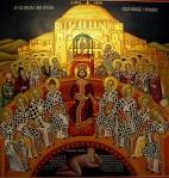 Christian Dogma
Christian Dogma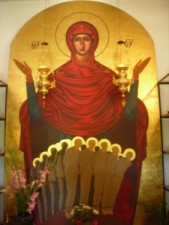 Christian Martyrs
Christian Martyrs Christian Orthodox Churches and Monasteries
Christian Orthodox Churches and Monasteries Christian Sermons and News
Christian Sermons and News Church's Teachings on Fasting
Church's Teachings on Fasting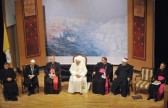 Ecumenism – a Great Heresy
Ecumenism – a Great Heresy Father George Calciu
Father George Calciu Life_a Sacred Gift form God
Life_a Sacred Gift form God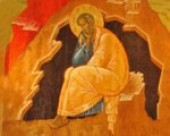 Orthodox Saints and Church Fathers
Orthodox Saints and Church Fathers Spiritual Elders
Spiritual Elders Daily Bible Readings
Daily Bible Readings Journey to Orthodoxy
Journey to Orthodoxy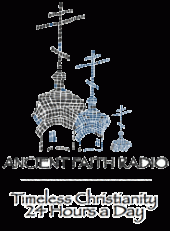 Listen to Ancient Faith Radio
Listen to Ancient Faith Radio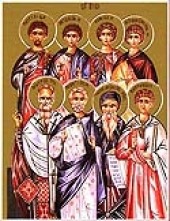 Orthodox Calendar of Feasts and Saints
Orthodox Calendar of Feasts and Saints Orthodox Christian Mission Center
Orthodox Christian Mission Center Orthodox Institute
Orthodox Institute OrthodoxChristianNetwork TV
OrthodoxChristianNetwork TV
Recent Comments